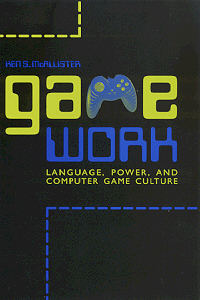introduction
|
|
|
|||
| A Review of Game Work: Language, Power, and Computer Game Culture | |||
 Table of Contents |
|||
| Ken
S. McAllister Tuscaloosa, AL: U of Alabama P, 2004 ISBN: 0-8173-1418-0 $39.95 pp. 232 |
|||
| Review by: | |||
| Ryan
M. Moeller Utah State University |
Kevin
Moberly North Carolina Wesleyan College |
||
|
|
|||
|
Ken McAllister's GameWork: Language, Power, and Computer Game Culture fills an important gap in computer game1 scholarship for Kairos' readers. A gamer himself, McAllister's experiences with computer games give his analysis a depth that is missing from many current scholarly works on the subject. McAllister, however, does not simply celebrate computer games, but instead argues for a rigorous critical method that scholars can use to come to terms with the contradictions of what he calls the computer game complex. McAllister thus develops a rich rhetorical theory to examine what is quickly becoming one of the major sites of worldwide cultural production, capturing moments of consumerism, liberating gameplay, labor issues, partisanship, design ideologies, and more. Based in large part upon Marxist historical materialism, Kenneth Burke's notion of agency, and Barry Brummett's taxonomy of meaning-making processes, McAllister's theoretical approach makes Game Work a must read for anyone interested in studying complex cultural artifacts like computer games from a rhetorical perspective. McAllister's book is divided into two parts and includes generous appendices, a glossary and an index. In part one, he outlines his critical methodology, which he calls "the grammar of gamework" (44). We devote most of our review to this section, dividing our summary of it into two parts: the gamework and the grammar of gamework. In part two, McAllister applies his grammar of gamework to several aspects of the computer game complex: the discourse of game developers, the project of reviewing games, and the economies of the computer game Black & White. We summarize part two of McAllister's book in the node entitled praxis. The first two appendices of McAllister's book contain diagrams of his grammar of gamework, while the third contains a list of the game titles mentioned throughout his book. The fourth appendix, "How to Run a Game Night," is an enormously helpful guide to establishing a critical game research group, discussing everything from where to hold a game night to who should be involved. |
|||